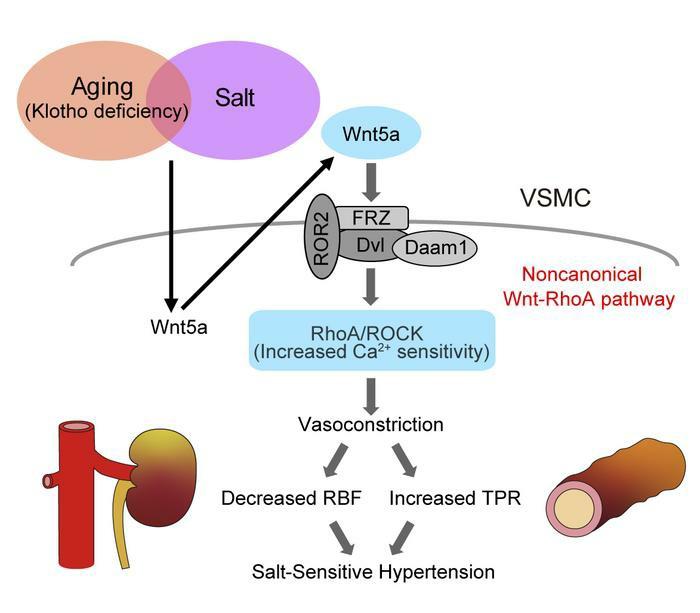
Credit: Copyright: © 2020, American Society for Clinical Investigation
High blood pressure is often called a silent killer because it is the biggest risk factor for the most death and disability worldwide including heart disease and stroke, but presents no symptoms as a warning indicator. Many elderly people have high blood pressure that is difficult to treat, and good preventative methods and appropriate markers have not been elucidated.
It has been known that high salt intake causes hypertension, but its exact mechanism was not understood until this study which found for the first time that Klotho deficiency, an anti-aging factor produced in the kidneys causes aging-associated hypertension through high salt intake.
Klotho is an anti-aging protein that acts as a hormone and is secreted into the blood from the kidneys. Its presence decreases with age causing the vascular and arterial system to stiffen. A recent study had shown the inverse relationship between the Klotho concentration and BP salt sensitivity. Hypertension is caused by excessive intake of salt, but the sensitivity of blood pressure to salt varies from individual to individual, and highly sensitive people are more likely to have high blood pressure.
In general, young people are less sensitive and are unlikely to develop hypertension, whereas older people are more sensitive to salt and are likely to develop hypertension. However, the mechanism of increased salt sensitivity with aging was unknown. Therefore, the research group first confirmed that salt sensitivity increased in aged mice, and revealed that the cause is that the blood concentration of the anti-aging factor Klotho protein decreases with age. Furthermore, the group clarified the molecular mechanism Wnt5a-RhoA pathway for the first time. The results showed that Klotho supplementation could prevent the development of hypertension, and Klotho levels could be a predictive marker for the development of hypertension.
Corresponding author and Specially Appointed Professor Toshiro Fujita of Shinshu University School of Medicine and Research Center for Social Systems, and Division of Epigenetics, Research Center for Advanced Science and Technology, University of Tokyo states that it took time, “to elucidate the molecular mechanism of salt-sensitive hypertension with aging. Although Klotho deficiency was known to activate Wnt signaling, the detailed mechanism by which Wnt activation causes vasoconstriction was unknown. We found that the Wnt signal has two pathways, the canonical pathway which was understood as significant in oncological research, but it took time to demonstrate that the Wnt-RhoA pathway of the non-canonical pathway causes vasoconstriction in cell experiments and mouse experiments.”
In experiments using aged mice and cells, abnormal activation of the above pathway could be reversed by supplementation with Klotho protein. As a result, it was possible to establish that the cause of salt-sensitive hypertension due to aging is Klotho protein decline.
The results of this experiment showed that Klotho supplementation could prevent the development of hypertension in the elderly and that Klotho levels could be a predictive marker for the development of hypertension. Trials for human verification is currently underway. Aging, a universal phenomenon causes not only hypertension but dementia and frailty, and impairs the healthy life expectancy of individuals. The aging-related phenomenon of Klotho protein deficiency may be related to the onset of dementia and sarcopenia, or the loss of muscle-mass and usage associated with aging. Its onset mechanism is currently under investigation.
###
For more information, please read the paper, Salt causes again-associated hypertension via vascular Wnt5a under Klotho deficiency in The Journal of Clinical Investigation.
Acknowledgments:
This work was supported by Japan Society for the Promotion of Science KAKENHI (grants 18K08028, 15H05788, 15H02538, and 18K19533) and Japan Agency for Medical Research and Development-Advanced Research and Development Programs for Medical Innovation (AMED-CREST) (grant JP16gm0510009).
Media Contact
Hitomi Thompson
[email protected]




